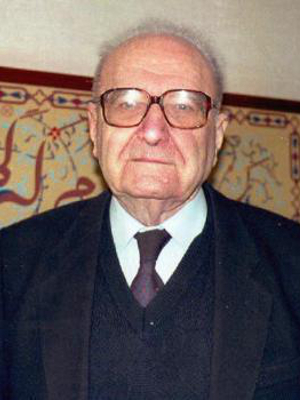The announcement of the death of the French philosopher Roger Garaudy (98) could be summarised in a short statement such as: „a controversial thinker has died“, if the controversies regarding this philosopher hadn´t been so particularly relevant and interesting for the Czechs. This is because he influenced, in a discrete but essential manner, the intellectual and political development in their country. At the beginning of the 1960´s the fossilized patterns of socialist realism of the stalinist times continued to be the single code of art work recognized by the rulers, causing despair to artists of all kinds. The need for artistic creation with its inseparable freedom naturally sought support worldwide.
The work of the French marxist philosopher Roger Garaudy, hardly a bourgeois deviation, was published in Czechoslovakia with a foreword by Aragon under the title „Realism without shores.“ This came in handy and became an anchor for those thinking rightfully that the role of art shoudn´t neccesarily serve the proletariat´s revolution. Garaudy helped to rehabilitate Kafka, and Jiří Pelikán, an important representative of the 1968 exile, was right in starting his lessons on „The Prague Spring“ in all languages with a sentence saying that this so-called period had begun a few years earlier with the Liblice conference dealing with Prague´s German writing author. Noticing Kafka, the following transformation or transformations of Garaudy were – as mentioned before – at least notable.
We still praise him for condemning the invasion of Czechoslovakia with the rest of the French Communist Party in August 1968. We aren´t surprised by the fact that he finally had a fight with the very same party and we follow him when he calls the party´s mentally limited general secretary Georges Marchais a „gravedigger of the CPF“. His subsequent exclusion from the party can be perceived as a neccesary outcome of Garaudy´s desperate effort to change a dinosaur horde into an open-minded political group.
It then becomes worse. Gradual conversions, first to Catholicism and later – and even more surprisingly – to Islam, can hardly be interpreted as an outcome of a spiritual thirst for the former dialectical materialist. Under the usual guise of „anti-zionism“ we find an anti-semitism of the worst kind in the „Founding Myths of Israeli Politics“ (1996). The Holocaust is suddenly, according to the former resistance fighter, only a fiction, one part of a worldwide Jewish plot justifying the Zionist expansion. Such „negativity“ or denial of crimes against humanity – is a crime in France and the author was found guilty of that crime as well as of an exceptionally dangerous form of spreading racial hatred. The only praise came from some Arab intellectuals.
If the meaning of life is to dance through it („Danser sa vie“ (1973), with the foreword by another Moslem convert, the choreographer Maurice Béjart, then it has to be said that Garaudy showed France and the world a notable dance. Nevertheless, he proved with his life that he was right to challenge the stalinist dogmas: Reality truly is shoreless.
published: 15. 7. 2012







